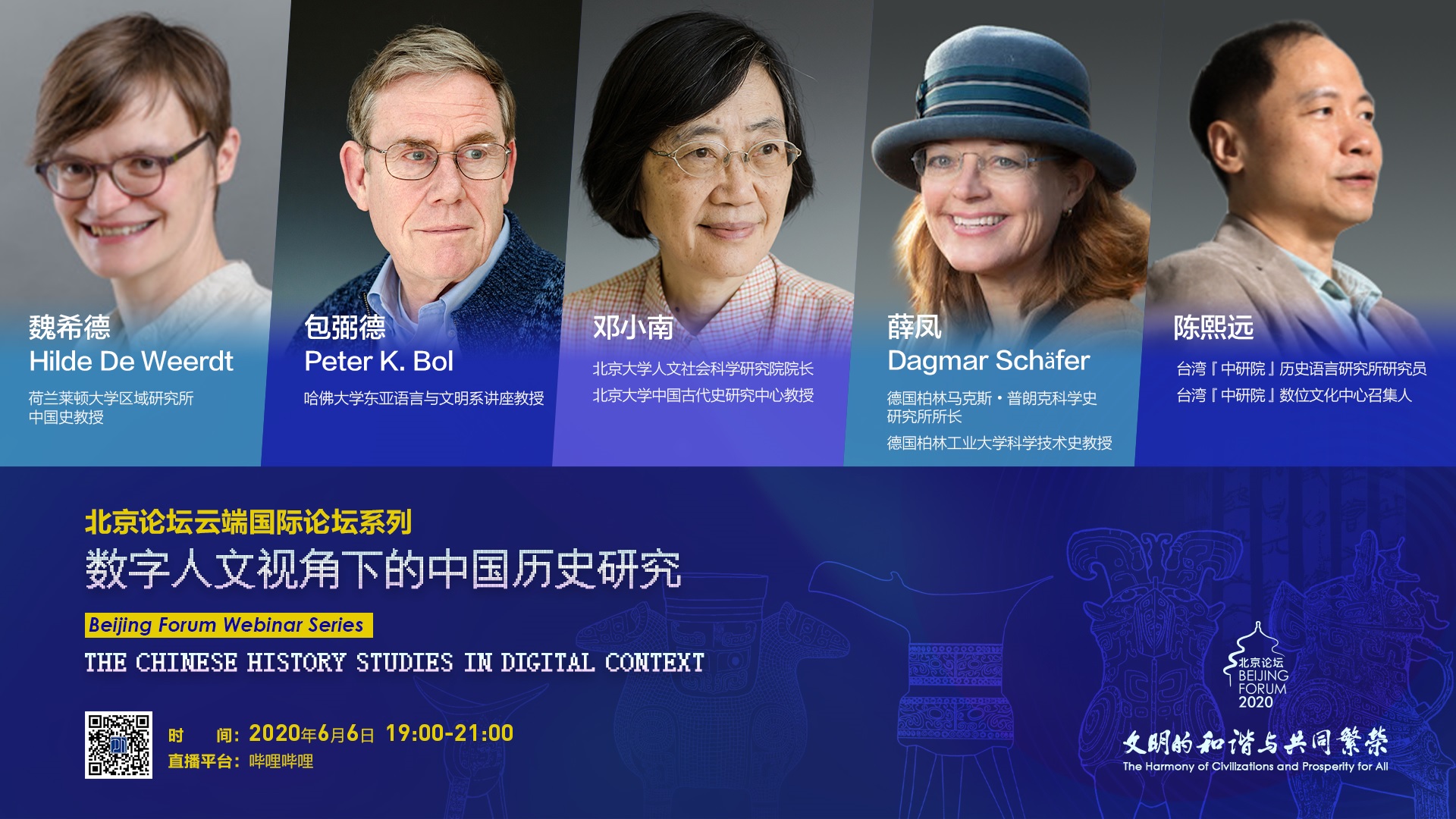
Theme: The Chinese History Studies in Digital Context
Time: Beijing time 19:00-21:00, June 6, 2020
Platform: Zoom, Bilibili. Please scan the QR code to entry the conference.

Organizers:
Digital Humanities Center of Peking University (preparatory)
Institute of Humanities and Social Sciences, Peking University
Department of History of Peking University
Beijing Forum
Panelists:
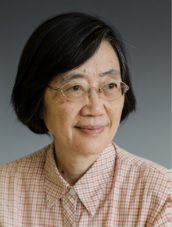
Deng Xiaonan
Director of Institute of Humanities and Social Sciences, Peking University, Professor of Center for Research on Ancient Chinese History, Peking University
Professor Deng’s fields of interest are the history of the Song Dynasty, history of bureaucracy, and history of women of the Tang and Song Dynasties. She has long been a dedicated advocate of digital humanities at Peking University. Her works include Invoking Imperial Ancestors' Instructions in Early Northern Song Politics and Women and Society in the Tang and Song Dynasties.
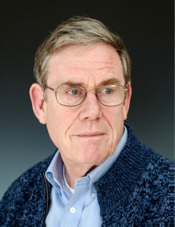
Peter K. Bol Charles H. Carswell
Professor of East Asian Languages and Civilizations, Harvard University
Professor Peter K. Bol is a renowned American scholar in field of Chinese intellectual history. He is devoted to the study of the intellectual history of the Tang and Song dynasties. As former Director of the China Historical Geographic Information System (CHGIS) and the China Biographical Data Bank (CBDB) at Harvard University, he has made a significant impact in the international digital humanities field. He has published Neo- Confucianism in History.
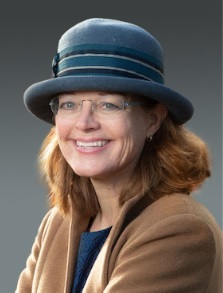
Dagmar Schäfer
Director of Max Planck Institute for the History of Science, Honorary
Professor in History of Technology at TU Berlin
Professor Dagmar Schäfer’s main field of research is the history of ancient Chinese science and technology, and she has just been awarded the Gottfried Wilhelm Leibniz Prize, Germany’s highest academic honor, in 2020. She has led a database project of Chinese local chronicles and developed a digital humanities research tool, LoGarRT. She has published The Crafting of the 10,000 Things: Knowledge and Technology in Seventeenth-Century China.
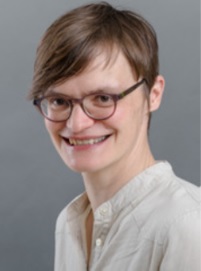
Hilde De Weerdt
Professor of Chinese History, the Leiden University Institute for Area
Studies (LIAS)
Professor Hilde De Weerdt is a Belgian sinologist. She is mainly engaged in research on Chinese political and social networks, the intellectual history of the Chinese imperial examination system, and the history of the Song Dynasty. She led the development of MARKUS, a semi-automatic markup platform for classical Chinese, which was selected as a runner up in the category Best Tool or Suite of TOOLS in the DH2016 awards. She has published Competition over Content: Negotiating Standards for the Civil Service Examinations in Imperial China (1127-1279) and Considering Citizenship in Imperial Chinese History.
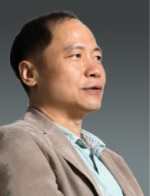
Chen Hsi-yuan
Research Fellow of The Institute of History and Philology of Academia Sinica, Director of Academia Sinica Center for Digital Cultures, Taiwan, China
Ph. D. in history and easr Asian linguistics, Harvard University. He is devoted to the study of the history of the Ming and Qing Dynasties, the change of religious concept in Sino-West cultural exchange during modern time,the government power and folk beliefs, historical writing and transition, daily life and li-fa order in the history of the Ming and Qing Dynasties and after, archival research in the history of the Ming and Qing Dynasties. His major works include “Propitious Omens and the Crisis of Political Authority: A Case Study of the Frequent Reports of Auspicious Clouds During the Yongzheng Reign”.
Hosts:
He Jin
Deputy Director of Department of History, Peking University
Liang Chen
Deputy Dean of School of History, Nanjing University
Shi Rui
Deputy Research Librarians, Center for Research on Ancient
Chinese History, Peking University
Convener:
Wang Jun
Professor of Department of Information Management, Head of
the Preparatory Committee of Digital Humanities Center of Peking
University
Description:
As the corpora for humanities research gradually become digitalized, digital methods have been increasingly adopted in the research and education of humanities, creating a new multidisciplinary field — digital humanities. On the one hand, technologies such as big data, natural language processing, and artificial intelligence provide researchers with new tools and computation-based paradigms; on the other hand, the tremendous expansion of research breadth and complexity, facilitated by computers, have brought new perspectives and new problems, thus boosting new energy into the development of the field.
As branch of study that involves multiple disciplines, digital humanities have broken through academic barriers and boundaries, providing a platform for multidisciplinary communication and collaboration, which in turn triggers disciplinary reorganization and organizational restructuring in universities and academic institutions.
As one of the webinar series of the Beijing Forum, this event is jointly organized by the Digital Humanities Center of Peking University, Institute of Humanities and Social Sciences, Peking University, Department of History of Peking University and the Beijing Forum. Under the theme of “The Chinese History Studies in Digital Context”, scholars with outstanding achievements in the field of Chinese history research from various countries and regions are invited to exchange and dialogue on cutting-edge academic issues such as how digital humanities methods can promote the development of history studies, how the pattern of traditional history research will change, how researchers can make full use of IT tools, what challenges are there for digital humanities methods and what are the bottlenecks that need to be overcome.
Agenda
19:00-19:05 Opening Address by Professor WANG JUN
19:05-19:10 Introduction of guests by Professor HE JIN
19:10-19:20 Speech by Professor DENG XIAOANA
19:20-19:30 Speech by Professor PETER K. BOL
19:30-19:40 Speech by Professor HILDE DE WEERDT
19:40-19:50 Speech by Professor DAGMAR SCHÄFER
19:50-20:00 Speech by Professor CHEN HSI-YUAN
20:00-20:50 Discussion hosted by Professor LIANG CHEN, Professor SHI RUI
20:50-21:00 Conclusion by Professor HE JIN, Professor WANG JUN